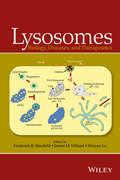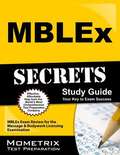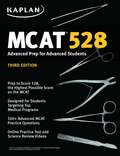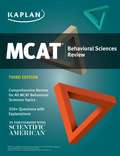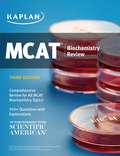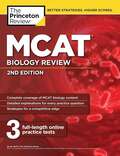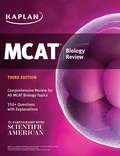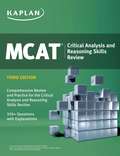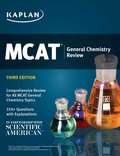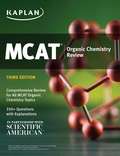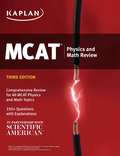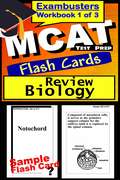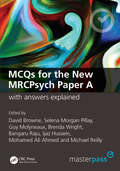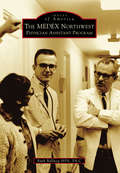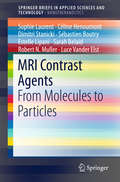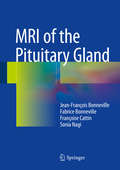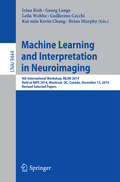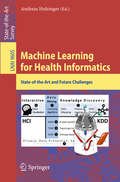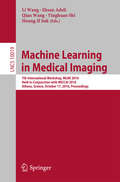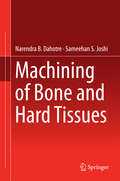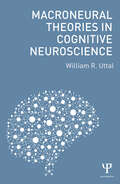- Table View
- List View
Lysosomes: Biology, Diseases, and Therapeutics
by Shuyan Lu James M. Willard Frederick R. MaxfieldDiscussing recent findings, up-to-date research, and novel strategies, the book integrates perspectives from pharmacology, toxicology, and biochemistry to illustrate the potential of lysosomes in drug discovery and development.* Explores basic principles and properties of lysosomes that allow them to act as regulators of cell metabolism, therapeutic targets, and sites for activation of drug conjugates * Discusses the role of lysosomes in metabolism, drug targeting, apoptosis, cancer, aging, inflammation, autophagy, metabolism, toxicity, and membrane repair* Introduces new pathways in therapeutic development and new mechanisms in drug development
MBLEx Secrets Study Guide: MBLEx Exam Review for the Massage and Bodywork Licensing Examination
by MBLEx Exam Secrets Test Prep StaffThis MBLEx study guide includes practice test questions. Our study guide contains easy-to-read essential summaries that highlight the key areas of the MBLEx test. Mometrix's MBLEx test study guide reviews the most important components of the MBLEx exam. The MBLEx Exam is extremely challenging, and thorough test preparation is essential for success. MBLEx Exam Secrets Study Guide is the ideal prep solution for anyone who wants to pass the MBLEx. Not only does it provide a comprehensive guide to the MBLEx Exam as a whole, it also provides practice test questions as well as detailed explanations of each answer. MBLEx Exam Secrets Study Guide includes: -An in-depth look at anatomy and physiology -A guide to kinesiology -An extensive overview of pathology, contraindications, areas of caution, and special populations -A breakdown of benefits and physiological effects of techniques that manipulate soft tissue -An examination of client assessment, reassessment, and treatment planning -A detailed guide of the overview of massage and bodywork modalities/culture/history -An analysis of ethics, boundaries, laws, regulations -A comprehensive review of guidelines for professional practice -Comprehensive practice questions with detailed answer explanations It's filled with the critical information you'll need in order to do well on the test: the concepts, procedures, principles, and vocabulary that the Federation of State Massage Therapy Boards (FSMTB) expects you to have mastered before sitting for the exam.
MCAT 528: Advanced Prep for Advanced Students
by KaplanMore people get into medical school with a Kaplan MCAT course than all major courses combined. Now the same results are available with Kaplan's MCAT 528. This book features thorough subject review, more questions than any competitor, and the highest-yield questions available. The commentary and instruction come directly from Kaplan MCAT experts and include targeted focus on the most-tested concepts.MCAT 528 offers:UNPARALLELED MCAT KNOWLEDGE: The Kaplan MCAT team has spent years studying every MCAT-related document available. In conjunction with our expert psychometricians, the Kaplan team is able to ensure the accuracy and realism of our practice materials.THOROUGH SUBJECT REVIEW: Written by top-rated, award-winning Kaplan instructors, all material has been vetted by editors with advanced science degrees and by a medical doctor.EXPANDED CONTENT THROUGHOUT: As the MCAT has continued to develop, this book has been updated continuously to match the AAMC's guidelines precisely--no more worrying if your prep is comprehensive!"STAR RATINGS" FOR EVERY SUBJECT: New for the 3rd Edition of MCAT 528, every topic is assigned a "star rating"--informed by Kaplan's decades of MCAT experience and facts straight from the testmaker--of how important it will be to your score on the real exam.MORE PRACTICE THAN THE COMPETITION: With 500+ questions throughout the book and access to a full-length practice test online, MCAT 528 has more practice than any other advanced MCAT book on the market.ONLINE COMPANION: One practice test and additional online resources help augment content studying. The MCAT is a computer-based test, so practicing in the same format as Test Day is key.KAPLAN'S MCAT REPUTATION: Kaplan is a leader in the MCAT prep market, and twice as many doctors prepared for the MCAT with Kaplan than with any other course.*UTILITY:MCAT 528 can be used alone or with the other companion books in Kaplan's MCAT Review series. * Doctors refers to US MDs who were licensed between 2001-2010 and used a fee-based course to prepare for the MCAT. The AlphaDetail, Inc. online study for Kaplan was conducted between Nov. 10 - Dec. 9, 2010 among 763 US licensed MDs, of whom 462 took the MCAT and used a fee-based course to prepare for it.
MCAT Behavioral Sciences Review: Online + Book
by KaplanMore people get into medical school with a Kaplan MCAT course than all major courses combined. Now the same results are available with MCAT Behavioral Sciences Review. This book features thorough subject review, more questions than any competitor, and the highest-yield questions available. The commentary and instruction come directly from Kaplan MCAT experts and include targeted focus on the most-tested concepts.MCAT Behavioral Sciences Review offers:UNPARALLELED MCAT KNOWLEDGE: The Kaplan MCAT team has spent years studying every MCAT-related document available. In conjunction with our expert psychometricians, the Kaplan team is able to ensure the accuracy and realism of our practice materials.THOROUGH SUBJECT REVIEW: Written by top-rated, award-winning Kaplan instructors, all material has been vetted by editors with advanced science degrees and by a medical doctor.EXPANDED CONTENT THROUGHOUT: As the MCAT has continued to develop, this book has been updated continuously to match the AAMC's guidelines precisely--no more worrying if your prep is comprehensive!"STAR RATINGS" FOR EVERY SUBJECT: New for the 3rd Edition of MCAT Behavioral Sciences Review, every topic in every chapter is assigned a "star rating"--informed by Kaplan's decades of MCAT experience and facts straight from the testmaker--of how important it will be to your score on the real exam.MORE PRACTICE THAN THE COMPETITION: With 350+ questions throughout the book and access to a full-length practice test online, MCAT Behavioral Sciences Review has more practice than any other MCAT behavioral sciences book on the market.ONLINE COMPANION: One practice test and additional online resources help augment content studying. The MCAT is a computer-based test, so practicing in the same format as Test Day is key.TOP-QUALITY IMAGES: With full-color, 3-D illustrations, charts, graphs and diagrams from the pages of Scientific American, MCAT Behavioral Sciences Review turns even the most intangible, complex science into easy-to-visualize concepts.KAPLAN'S MCAT REPUTATION: Kaplan is a leader in the MCAT prep market, and twice as many doctors prepared for the MCAT with Kaplan than with any other course.*UTILITY: Can be used alone or with the other companion books in Kaplan's MCAT Review series.* Doctors refers to US MDs who were licensed between 2001-2010 and used a fee-based course to prepare for the MCAT. The AlphaDetail, Inc. online study for Kaplan was conducted between Nov. 10 - Dec. 9, 2010 among 763 US licensed MDs, of whom 462 took the MCAT and used a fee-based course to prepare for it.
MCAT Biochemistry Review: Online + Book
by KaplanMore people get into medical school with a Kaplan MCAT course than all major courses combined. Now the same results are available with MCAT Biochemistry Review. This book features thorough subject review, more questions than any competitor, and the highest-yield questions available. The commentary and instruction come directly from Kaplan MCAT experts and include targeted focus on the most-tested concepts.MCAT Biochemistry Review offers:UNPARALLELED MCAT KNOWLEDGE: The Kaplan MCAT team has spent years studying every MCAT-related document related available. In conjunction with our expert psychometricians, the Kaplan team is able to ensure the accuracy and realism of our practice materials.THOROUGH SUBJECT REVIEW: Written by top-rated, award-winning Kaplan instructors, all material has been vetted by editors with advanced science degrees and by a medical doctor.EXPANDED CONTENT THROUGHOUT: As the MCAT has continued to develop, this book has been updated continuously to match the AAMC's guidelines precisely--no more worrying if your prep is comprehensive!"STAR RATINGS" FOR EVERY SUBJECT: New for the 3rd Edition of MCAT Biochemistry Review, every topic in every chapter is assigned a "star rating"--informed by Kaplan's decades of MCAT experience and facts straight from the testmaker--of how important it will be to your score on the real exam.MORE PRACTICE THAN THE COMPETITION: With 350+ questions throughout the book and access to a full-length practice test online, MCAT Biochemistry Review has more practice than any other MCAT biochemistry book on the market.ONLINE COMPANION: One practice test and additional online resources help augment content studying. The MCAT is a computer-based test, so practicing in the same format as Test Day is key.TOP-QUALITY IMAGES: With full-color, 3-D illustrations, charts, graphs and diagrams from the pages of Scientific American, MCAT Biochemistry Review turns even the most intangible, complex science into easy-to-visualize concepts.KAPLAN'S MCAT REPUTATION: Kaplan is a leader in the MCAT prep market, and twice as many doctors prepared for the MCAT with Kaplan than with any other course.*UTILITY: Can be used alone or with the other companion books in Kaplan's MCAT Review series.* Doctors refers to US MDs who were licensed between 2001-2010 and used a fee-based course to prepare for the MCAT. The AlphaDetail, Inc. online study for Kaplan was conducted between Nov. 10 - Dec. 9, 2010 among 763 US licensed MDs, of whom 462 took the MCAT and used a fee-based course to prepare for it.
MCAT Biology Review (Graduate School Test Preparation)
by Princeton StaffThe MCAT is a test of more than just the facts about basic physical and biological sciences—it’s an in-depth, rigorous examination of your knowledge of scientific concepts and principles, as well as your critical-thinking and writing skills. With the Princeton Review’s subject-specific MCAT series, you can focus your review on the MCAT topics that are most challenging to you. Each book in the series contains the most in-depth coverage of subjects tested on the MCAT.
MCAT Biology Review: Online + Book
by KaplanMore people get into medical school with a Kaplan MCAT course than all major courses combined. Now the same results are available with MCAT Biology Review. This book features thorough subject review, more questions than any competitor, and the highest-yield questions available. The commentary and instruction come directly from Kaplan MCAT experts and include targeted focus on the most-tested concepts.MCAT Biology Review offers:UNPARALLELED MCAT KNOWLEDGE: The Kaplan MCAT team has spent years studying every MCAT-related document available. In conjunction with our expert psychometricians, the Kaplan team is able to ensure the accuracy and realism of our practice materials.THOROUGH SUBJECT REVIEW: Written by top-rated, award-winning Kaplan instructors, all material has been vetted by editors with advanced science degrees and by a medical doctor.EXPANDED CONTENT THROUGHOUT: As the MCAT has continued to develop, this book has been updated continuously to match the AAMC's guidelines precisely--no more worrying if your prep is comprehensive!"STAR RATINGS" FOR EVERY SUBJECT: New for the 3rd Edition of MCAT Biology Review, every topic in every chapter is assigned a "star rating"--informed by Kaplan's decades of MCAT experience and facts straight from the testmaker--of how important it will be to your score on the real exam.MORE PRACTICE THAN THE COMPETITION: With 350+ questions throughout the book and access to a full-length practice test, MCAT Biology Review has more practice than any other MCAT biology book on the market.ONLINE COMPANION: One practice test and additional online resources help augment content studying. The MCAT is a computer-based test, so practicing in the same format as Test Day is key.TOP-QUALITY IMAGES: With full-color, 3-D illustrations, charts, graphs and diagrams from the pages of Scientific American, MCAT Biology Review turns even the most intangible, complex science into easy-to-visualize concepts.KAPLAN'S MCAT REPUTATION: Kaplan is a leader in the MCAT prep market, and twice as many doctors prepared for the MCAT with Kaplan than with any other course.*UTILITY: Can be used alone or with the other companion books in Kaplan's MCAT Review series. * Doctors refers to US MDs who were licensed between 2001-2010 and used a fee-based course to prepare for the MCAT. The AlphaDetail, Inc. online study for Kaplan was conducted between Nov. 10 - Dec. 9, 2010 among 763 US licensed MDs, of whom 462 took the MCAT and used a fee-based course to prepare for it.
MCAT Critical Analysis and Reasoning Skills Review: Online + Book
by KaplanMore people get into medical school with a Kaplan MCAT course than all major courses combined. Now the same results are available with MCAT Critical Analysis and Reasoning Skills Review. This book features thorough subject review, more questions than any competitor, and the highest-yield questions available. The commentary and instruction come directly from Kaplan MCAT experts and include targeted focus on the most-tested concepts.MCAT Critical Analysis and Reasoning Skills Review offers:UNPARALLELED MCAT KNOWLEDGE: The Kaplan MCAT team has spent years studying every MCAT-related document available. In conjunction with our expert psychometricians, the Kaplan team is able to ensure the accuracy and realism of our practice materials.THOROUGH SUBJECT REVIEW: Written by top-rated, award-winning Kaplan instructors, all material has been vetted by editors with advanced English degrees and by a medical doctor.EXPANDED CONTENT THROUGHOUT: The AAMC tests not only content knowledge, critical thinking, and critical analysis and reasoning skills, but also two other important scientific skills: research design and the execution of research, and data-based and statistical analysis. This book has expanded material to help you master these skills for Test Day.MORE PRACTICE THAN THE COMPETITION: With questions throughout the book and access to a full-length practice test online, MCAT CARS Review has more practice than any other MCAT CARS book on the market.ONLINE COMPANION: One practice test and additional online resources help augment content studying. The MCAT is a computer-based test, so practicing in the same format as Test Day is key.KAPLAN'S MCAT REPUTATION: Kaplan is a leader in the MCAT prep market, and twice as many doctors prepared for the MCAT with Kaplan than with any other course.*UTILITY: Can be used alone or with other companion books in Kaplan's MCAT Review series.* Doctors refers to US MDs who were licensed between 2001-2010 and used a fee-based course to prepare for the MCAT. The AlphaDetail, Inc. online study for Kaplan was conducted between Nov. 10 - Dec. 9, 2010 among 763 US licensed MDs, of whom 462 took the MCAT and used a fee-based course to prepare for it.
MCAT General Chemistry Review: Online + Book
by KaplanMore people get into medical school with a Kaplan MCAT course than all major courses combined. Now the same results are available with MCAT General Chemistry Review. This book features thorough subject review, more questions than any competitor, and the highest-yield questions available. The commentary and instruction come directly from Kaplan MCAT experts and include targeted focus on the most-tested concepts.MCAT General Chemistry Review offers:UNPARALLELED MCAT KNOWLEDGE: The Kaplan MCAT team has spent years studying every MCAT-related document available. In conjunction with our expert psychometricians, the Kaplan team is able to ensure the accuracy and realism of our practice materials.THOROUGH SUBJECT REVIEW: Written by top-rated, award-winning Kaplan instructors, all material has been vetted by editors with advanced science degrees and by a medical doctor.EXPANDED CONTENT THROUGHOUT: As the MCAT has continued to develop, this book has been updated continuously to match the AAMC's guidelines precisely--no more worrying if your prep is comprehensive!"STAR RATINGS" FOR EVERY SUBJECT: New for the 3rd Edition of MCAT General Chemistry Review, every topic in every chapter is assigned a "star rating"--informed by Kaplan's decades of MCAT experience and facts straight from the testmaker--of how important it will be to your score on the real exam.MORE PRACTICE THAN THE COMPETITION: With 350+ questions throughout the book and access to a full-length practice test online, MCAT General Chemistry Review has more practice than any other MCAT general chemistry book on the market.ONLINE COMPANION: One practice test and additional online resources help augment content studying. The MCAT is a computer-based test, so practicing in the same format as Test Day is key.TOP-QUALITY IMAGES: With full-color, 3-D illustrations, charts, graphs and diagrams from the pages of Scientific American, MCAT General Chemistry Review turns even the most intangible, complex science into easy-to-visualize concepts.KAPLAN'S MCAT REPUTATION: Kaplan is a leader in the MCAT prep market, and twice as many doctors prepared for the MCAT with Kaplan than with any other course.*UTILITY: Can be used alone or with the other companion books in Kaplan's MCAT Review series.* Doctors refers to US MDs who were licensed between 2001-2010 and used a fee-based course to prepare for the MCAT. The AlphaDetail, Inc. online study for Kaplan was conducted between Nov. 10 - Dec. 9, 2010 among 763 US licensed MDs, of whom 462 took the MCAT and used a fee-based course to prepare for it.
MCAT Organic Chemistry Review: Online + Book
by KaplanMore people get into medical school with a Kaplan MCAT course than all major courses combined. Now the same results are available with MCAT Organic Chemistry Review. This book features thorough subject review, more questions than any competitor, and the highest-yield questions available. The commentary and instruction come directly from Kaplan MCAT experts and include targeted focus on the most-tested concepts.MCAT Organic Chemistry Review offers:UNPARALLELED MCAT KNOWLEDGE: The Kaplan MCAT team has spent years studying every MCAT-related document available. In conjunction with our expert psychometricians, the Kaplan team is able to ensure the accuracy and realism of our practice materials.THOROUGH SUBJECT REVIEW: Written by top-rated, award-winning Kaplan instructors, all material has been vetted by editors with advanced science degrees and by a medical doctor.EXPANDED CONTENT THROUGHOUT: As the MCAT has continued to develop, this book has been updated continuously to match the AAMC's guidelines precisely--no more worrying if your prep is comprehensive!"STAR RATINGS" FOR EVERY SUBJECT: New for the 3rd Edition of MCAT Organic Chemistry Review, every topic in every chapter is assigned a "star rating"--informed by Kaplan's decades of MCAT experience and facts straight from the testmaker--of how important it will be to your score on the real exam.MORE PRACTICE THAN THE COMPETITION: With questions throughout the book and access to a full-length practice test online, MCAT Organic Chemistry Review has more practice than any other MCAT organic chemistry book on the market.ONLINE COMPANION: One practice test and additional online resources help augment content studying. The MCAT is a computer-based test, so practicing in the same format as Test Day is key.TOP-QUALITY IMAGES: With full-color, 3-D illustrations, charts, graphs and diagrams from the pages of Scientific American, MCAT Organic Chemistry Review turns even the most intangible, complex science into easy-to-visualize concepts.KAPLAN'S MCAT REPUTATION: Kaplan is a leader in the MCAT prep market, and twice as many doctors prepared for the MCAT with Kaplan than with any other course.*UTILITY: Can be used alone or with the other companion books in Kaplan's MCAT Review series. * Doctors refers to US MDs who were licensed between 2001-2010 and used a fee-based course to prepare for the MCAT. The AlphaDetail, Inc. online study for Kaplan was conducted between Nov. 10 - Dec. 9, 2010 among 763 US licensed MDs, of whom 462 took the MCAT and used a fee-based course to prepare for it.
MCAT Physics and Math Review: Online + Book
by KaplanMore people get into medical school with a Kaplan MCAT course than all major courses combined. Now the same results are available with MCAT Physics and Math Review. This book features thorough subject review, more questions than any competitor, and the highest-yield questions available. The commentary and instruction come directly from Kaplan MCAT experts and include targeted focus on the most-tested concepts.MCAT Physics and Math Review offers:UNPARALLELED MCAT KNOWLEDGE: The Kaplan MCAT team has spent years studying every MCAT-related document available. In conjunction with our expert psychometricians, the Kaplan team is able to ensure the accuracy and realism of our practice materials.THOROUGH SUBJECT REVIEW: Written by top-rated, award-winning Kaplan instructors, all material has been vetted by editors with advanced science degrees and by a medical doctor.EXPANDED CONTENT THROUGHOUT: While the MCAT has continued to develop, this book has been updated continuously to match the AAMC's guidelines precisely--no more worrying if your prep is comprehensive!"STAR RATINGS" FOR EVERY SUBJECT: New for the 3rd Edition of MCAT Physics and Math Review, every topic in every chapter is assigned a "star rating"--informed by Kaplan's decades of MCAT experience and facts straight from the testmaker--of how important it will be to your score on the real exam.MORE PRACTICE THAN THE COMPETITION: With 350+ questions throughout the book and access to a full-length practice test online, MCAT Physics and Math Review has more practice than any other MCAT physics and math book on the market.ONLINE COMPANION: One practice test and additional online resources help augment content studying. The MCAT is a computer-based test, so practicing in the same format as Test Day is key.TOP-QUALITY IMAGES: With full-color, 3-D illustrations, charts, graphs and diagrams from the pages of Scientific American, MCAT Physics and Math Review turns even the most intangible, complex science into easy-to-visualize concepts.KAPLAN'S MCAT REPUTATION: Kaplan is a leader in the MCAT prep market, and twice as many doctors prepared for the MCAT with Kaplan than with any other course.*UTILITY: Can be used alone or with the other companion books in Kaplan's MCAT Review series.* Doctors refers to US MDs who were licensed between 2001-2010 and used a fee-based course to prepare for the MCAT. The AlphaDetail, Inc. online study for Kaplan was conducted between Nov. 10 - Dec. 9, 2010 among 763 US licensed MDs, of whom 462 took the MCAT and used a fee-based course to prepare for it.
MCAT Test Prep Flash Cards: Inorganic Chemistry (Exambusters MCAT Workbook #2 of 3)
by Ace Inc.<P><P><i>Advisory: Bookshare has learned that this book offers only partial accessibility. We have kept it in the collection because it is useful for some of our members. Benetech is actively working on projects to improve accessibility issues such as these.</i><P><P> 700 questions and answers. Essential chemistry formulas and concepts you need. <P><P>Topics: Metric System, Matter, Atoms, Formulas, Moles, Reactions, Elements, Chemical Bonds, Phase Changes, Solutions, Reaction Rates, Acids and Bases, Oxidation and Reduction, Introduction to Organic <P>EXAMBUSTERS MCAT Prep Workbooks provide comprehensive, fundamental MCAT review--one fact at a time--to prepare students to take practice MCAT tests. Each MCAT study guide focuses on one specific subject area covered on the MCAT exam. From 300 to 600 questions and answers, each volume in the MCAT series is a quick and easy, focused read. Reviewing MCAT flash cards is the first step toward more confident MCAT preparation and ultimately, higher MCAT exam scores!
MCAT Test Prep Flash Cards: Review Biology (Exambusters MCAT Workbook #1 of 3)
by Ace Inc.<P><P><i>Advisory: Bookshare has learned that this book offers only partial accessibility. We have kept it in the collection because it is useful for some of our members. Benetech is actively working on projects to improve accessibility issues such as these.</i><P><P> 450 questions and answers. <P><P>Topics: Cells, Biochemistry and Energy, Evolution, Kingdoms: Monera, Fungi, Protista, Plants, Animals; Human: Locomotion, Circulation, Immunology, Respiration, Excretion, Digestion, Nervous System <P>EXAMBUSTERS MCAT Prep Workbooks provide comprehensive, fundamental MCAT review--one fact at a time--to prepare students to take practice MCAT tests. Each MCAT study guide focuses on one specific subject area covered on the MCAT exam. From 300 to 600 questions and answers, each volume in the MCAT series is a quick and easy, focused read. Reviewing MCAT flash cards is the first step toward more confident MCAT preparation and ultimately, higher MCAT exam scores!
MCAT Test Prep Flash Cards: Review Physics (Exambusters MCAT Workbook #3 of 3)
by Ace Inc.<P><P><i>Advisory: Bookshare has learned that this book offers only partial accessibility. We have kept it in the collection because it is useful for some of our members. Benetech is actively working on projects to improve accessibility issues such as these.</i><P><P> 600 questions and answers. Sample problems. <P><P>Topics: Metric System, Motion and Forces, Work and Energy, Fluids, Sound, Light and Optics, Static Electricity, D.C. and A.C. Circuits, Magnetism <P>EXAMBUSTERS MCAT Prep Workbooks provide comprehensive, fundamental MCAT review--one fact at a time--to prepare students to take practice MCAT tests. Each MCAT study guide focuses on one specific subject area covered on the MCAT exam. From 300 to 600 questions and answers, each volume in the MCAT series is a quick and easy, focused read. Reviewing MCAT flash cards is the first step toward more confident MCAT preparation and ultimately, higher MCAT exam scores!
MCQs for the New MRCPsych Paper A with Answers Explained (MasterPass)
by David Browne Selena Morgan PillayComprising of 400 MCQs, this book provides essential revision content to help you pass the recently introduced MRCPsych Paper A. The most recent guidelines for the new curriculum have been followed in compiling the content. MCQs for the New MRCPsych Paper A with Answers Explained is an invaluable aid for all candidates for the examination of the Royal College of Psychiatrists. Other clinicians and undergraduate students in medicine and health sciences will also find it useful.
MEDEX Northwest Physician Assistant Program, The (Images of America)
by Ruth Ballweg MPA PA-CThe MEDEX Northwest Physician Assistant Program was created at the University of Washington in 1968 as one of the nation's first physician assistant (PA) programs. A joint project of the Washington State Medical Association and the University of Washington School of Medicine, MEDEX was designed to meet the needs of overworked physicians in rural communities. As envisioned by MEDEX founder Dr. Richard A. Smith, "Physician Assistants were created by physicians, for physicians." Initially, all MEDEX students were former military corpsmen returning from Vietnam. Based on their extensive clinical experience, they were well accepted by doctors and their patients. Dr. Richard Smith was a former Peace Corps physician and leader of the federal project to desegregate the US hospital "system" as a requirement for Medicare reimbursement. Dr. Smith's founding principles for MEDEX included a collaborative model for community and practitioner involvement--the framework for the MEDEX Program throughout its 45-year history.
MRI Contrast Agents
by Sophie Laurent Céline Henoumont Dimitri Stanicki Sébastien Boutry Estelle Lipani Sarah Belaid Robert N. Muller Luce Vander ElstThis book describes the multiple aspects of (i) preparation of the magnetic core, (ii) the stabilization with different coatings, (iii) the physico-chemical characterization and (iv) the vectorization to obtain specific nanosystems. Several bio-applications are also presented in this book. In the early days of Magnetic Resonance Imaging (MRI), paramagnetic ions were proposed as contrast agents to enhance the diagnostic quality of MR images. Since then, academic and industrial efforts have been devoted to the development of new and more efficient molecular, supramolecular and nanoparticular systems. Old concepts and theories, like paramagnetic relaxation, were revisited and exploited, leading to new scientific tracks. With their high relaxivity payload, the superparamagnetic nanoparticles are very appealing in the context of molecular imaging but challenges are still numerous: absence of toxicity, specificity, ability to cross the biological barriers, etc.
MRI of the Pituitary Gland
by Jean-François Bonneville Fabrice Bonneville Françoise Cattin Sonia NagiThis clinically oriented book will familiarize the reader with all aspects of the diagnosis of tumors and other disorders of the pituitary gland by means of magnetic resonance imaging (MRI). The coverage includes acromegaly, Cushing's disease, Rathke cleft cysts, prolactinomas, incidentalomas, nonsecreting adenomas, other lesions of the sellar area, hypophysitis, and central diabetes insipidus. Normal radiologic anatomy and the numerous normal variants are described, and guidance is also provided on difficulties, artifacts, and other pitfalls. The book combines concise text and high-quality images with a question and answer format geared toward the needs of the practitioner. MRI is today considered the cornerstone in the diagnosis of diseases of the hypophyseal-hypothalamic region but the relatively small size of the pituitary gland, its deep location, the many normal anatomic variants, and the often tiny size of lesions can hinder precise evaluation of the anatomic structures and particularly the pituitary gland itself. Radiologists and endocrinologists will find MRI of the Pituitary Gland to be full of helpful information on this essential examination, and the book will also be of interest to internists and neurosurgeons.
Machine Learning and Interpretation in Neuroimaging
by Brian Murphy Georg Langs Irina Rish Leila Wehbe Guillermo Cecchi Kai-min Kevin ChangThis book constitutes the revised selected papers from the 4th International Workshop on Machine Learning and Interpretation in Neuroimaging, MLINI 2014, held in Montreal, QC, Canada, in December 2014 as a satellite event of the 11th annual conference on Neural Information Processing Systems, NIPS 2014. The 10 MLINI 2014 papers presented in this volume were carefully reviewed and selected from 17 submissions. They were organized in topical sections named: networks and decoding; speech; clinics and cognition; and causality and time-series. In addition, the book contains the 3 best papers presented at MLINI 2013.
Machine Learning for Health Informatics
by Andreas HolzingerMachine learning (ML) is the fastest growing field in computer science, and Health Informatics (HI) is amongst the greatest application challenges, providing future benefits in improved medical diagnoses, disease analyses, and pharmaceutical development. However, successful ML for HI needs a concerted effort, fostering integrative research between experts ranging from diverse disciplines from data science to visualization. Tackling complex challenges needs both disciplinary excellence and cross-disciplinary networking without any boundaries. Following the HCI-KDD approach, in combining the best of two worlds, it is aimed to support human intelligence with machine intelligence. This state-of-the-art survey is an output of the international HCI-KDD expert network and features 22 carefully selected and peer-reviewed chapters on hot topics in machine learning for health informatics; they discuss open problems and future challenges in order to stimulate further research and international progress in this field.
Machine Learning in Medical Imaging
by Qian Wang Li Wang Ehsan Adeli Yinghuan Shi Heung-Il SukThis book constitutes the refereed proceedings of the 7th International Workshop on Machine Learning in Medical Imaging, MLMI 2016, held in conjunction with MICCAI 2016, in Athens, Greece, in October 2016. The 38 full papers presented in this volume were carefully reviewed and selected from 60 submissions. The main aim of this workshop is to help advance scientific research within the broad field of machine learning in medical imaging. The workshop focuses on major trends and challenges in this area, and presents works aimed to identify new cutting-edge techniques and their use in medical imaging.
Machine Learning in Medical Imaging: 7th International Workshop, MLMI 2016, Held in Conjunction with MICCAI 2016, Athens, Greece, October 17, 2016, Proceedings (Lecture Notes in Computer Science #10019)
by Li Wang, Ehsan Adeli, Qian Wang, Yinghuan Shi and Heung-Il SukThis book constitutes the refereed proceedings of the 7th International Workshop on Machine Learning in Medical Imaging, MLMI 2016, held in conjunction with MICCAI 2016, in Athens, Greece, in October 2016. The 38 full papers presented in this volume were carefully reviewed and selected from 60 submissions. The main aim of this workshop is to help advance scientific research within the broad field of machine learning in medical imaging. The workshop focuses on major trends and challenges in this area, and presents works aimed to identify new cutting-edge techniques and their use in medical imaging.
Machining of Bone and Hard Tissues
by Narendra Dahotre Sameehan JoshiThis book provides an in-depth review of state-of-the-art orthopaedic techniques and basic mechanical operations (drilling, boring, cutting, grinding/milling) involved in present day orthopaedic surgery. Casting a light on exploratory hybrid operations, as well as non-conventional techniques such as laser assisted operations, this book further extends the discussion to include physical aspects of the surgery in view of material (bone) and process parameters. Featuring detailed discussion of the computational modeling of forces (mechanical and thermal) involved in surgical procedures for the planning and optimization of the process/procedure and system development, this book lays the foundations for efforts towards the future development of improved orthopaedic surgery. With topics including the role of bone machining during surgical operations; the physical properties of the bone which influence the response to any machining operation, and robotic automation, this book will be a valuable and comprehensive literature source for years to come.
Macro-Glycoligands
by Xue-Long SunThis volume details methods and protocols for the synthesis and characterization of glycopolymers and their biomedical applications. Chapters are divided into three parts covering synthesis and characterization of glycopolymers; glycopolymer-nanoparticle conjugates; and surface immobilized glycopolymers. Written for the Methods in Molecular Biology series, chapters include introductions to their respective topics, lists of the necessary materials and reagents, step-by-step, readily reproducible laboratory protocols, and tips on troubleshooting and avoiding known pitfalls. Authoritative and practical, Macro-Glycoligands: Methods and Protocols aims to ensure successful results in the further study of this vital field.
Macroneural Theories in Cognitive Neuroscience
by William R. UttalIn this book, William R. Uttal continues his analysis and critique of theories of mind. This book considers theories that are based on macroneural responses (such as those obtained from fMRI) that represent the averaged or cumulative responses of many neurons. The analysis is carried out with special emphasis on the logical and conceptual difficulties in developing a theory but with special attention to some of the current attempts to go from these cumulative responses to explanations of the grand question of how the mind is generated by the brain. While acknowledging the importance of these macroneural techniques in the study of the anatomy and physiology of the brain, Uttal concludes that this macroneural approach is not likely to produce a valid neural theory of cognition because the critical information—the states of the individual neurons—involved in brain activity becoming mental activity is actually lost in the process of summation. Controversial topics are considered in detail including discussions of empirical, logical, and technological barriers to theory building in cognitive neuroscience.
